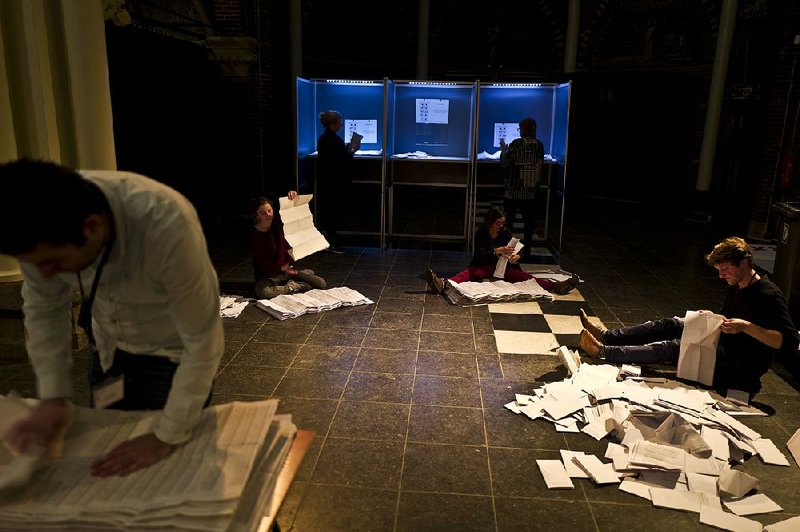THE HAGUE, Netherlands -- Dutch Prime Minister Mark Rutte on Wednesday claimed a parliamentary election victory over anti-Islam lawmaker Geert Wilders.
The Netherlands' main exit poll suggested Rutte's party had won the most seats in the 150-member legislature. Wilders' far-right party was projected to share a distant second place with two other parties.
After the United Kingdom's vote to leave the European Union and Donald Trump's election as U.S. president, "the Netherlands said, 'Whoa! Stop!' to the wrong kind of populism," said Rutte, who is now set for a third term as prime minister.
"We want to stick to the course we have -- safe and stable and prosperous," he added.
Wilders had insisted that whatever the result of the election, the kind of populist politics he and others in Europe represent aren't going away.
"Rutte has not seen the back of me!!" Wilders said in a Twitter message after the exit poll results were released.
Both France and Germany have elections this year in which far-right candidates and parties are hoping to make an impact.
"Wilders could not win the election," German socialist leader Martin Schulz tweeted. "I am relieved, but we need to continue to fight for an open and Free Europe."
The Dutch voted in huge numbers Wednesday, with turnout estimated to have reached 82 percent.
The Ipsos exit poll had the Green Left party registering a historic victory, turning it into the largest party on the left wing of Dutch politics for the first time. The gains come after a strong campaign by leader Jesse Klaver.
"This is a fantastic result for us, a historic victory," Green Left Chairman Marjolein Meijer said.
It remains to be seen whether the 30-year-old Klaver will take his party into the next ruling coalition, which looks likely to be dominated by Rutte's People's Party for Freedom and other right-leaning parties.
The Labor Party, led by Eurogroup President Jeroen Dijsselbloem, appeared to have lost most of the 38 seats it held after the previous election, according to the Ipsos exit poll.
Because of the result, it looked unlikely that Dijsselbloem would be able to hang on to his post of leading the 19-nation Eurogroup, which manages the euro currency used by 19 nations in the European Union.
Rutte had framed the election as a choice between continuity and chaos, portraying himself as a safe custodian of the nation's economic recovery and casting Wilders as a far-right radical who was unprepared to make tough decisions.
The chance of Wilders becoming prime minister in the Netherlands, where a proportional representation voting system all but guarantees coalition governments, was remote, even if his party had placed first in the election.
Wilders' one-page election manifesto included pledges to close borders to immigrants from Muslim nations, shutter mosques and ban the Koran, as well as take the Netherlands out of the EU.
Rutte has driven through unpopular austerity measures over the past four years, but the Dutch economic recovery has gathered pace and unemployment has fallen fast.
Wilders, meanwhile, tapped into discontent among voters who say they are not benefiting from the economic recovery.
The Labor Party appeared to have been hammered by its supporters for its role over the past four years in pushing through a tough austerity package as junior member in a two-party Cabinet with Rutte's People's Party.
The coalition the People's Party had with the Labor Party can no longer be replicated because of Labor's lost seats, and the prime minister is likely to look to the right for new coalition partners.
Rutte has been resolute about not wanting to rule with Wilders, so that tightens the market in which he can acquire the necessary 75-seat threshold.
Weeks, if not months, of coalition-building talks may be required before a new government is installed.
A Section on 03/16/2017
